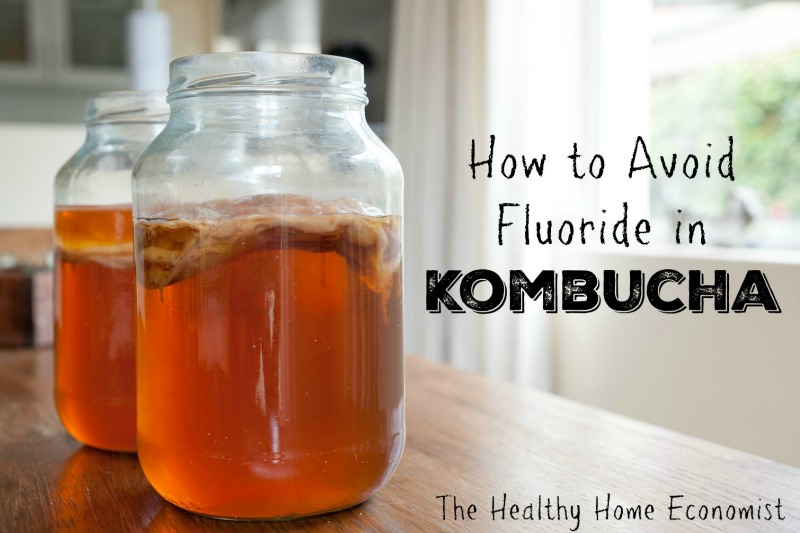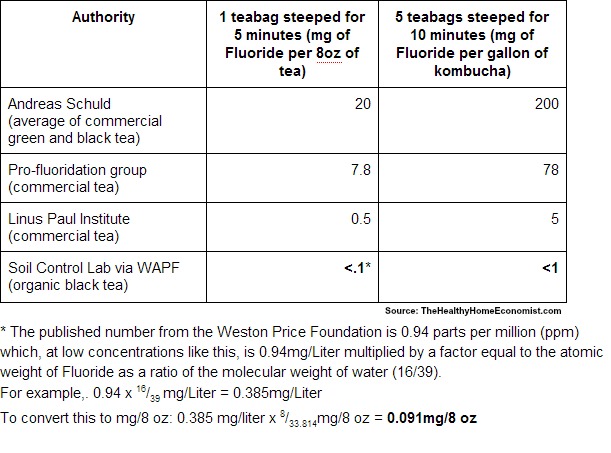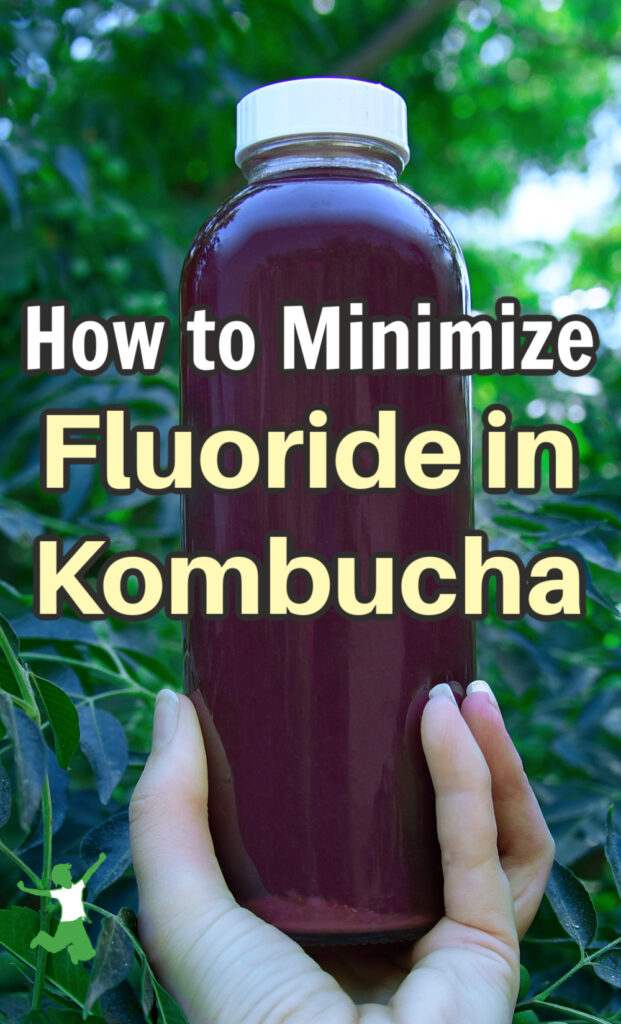Table of Contents[Hide][Show]
- Is Organic Tea Safe?
- How Does Kombucha Compare with Fluoridated Water?
- How to Drink Kombucha Safely
- Fluoride Detox
10 Ways to Avoid Fluoride in Kombucha+−
- Source high-quality organic tea
- Use organic white tea
- Check tea country of origin
- Steep tea water no longer than 10 minutes
- Avoid bottled kombucha from the store
- Use only nonfluoridated water for making kombucha
- Make kombucha with other herbal teas
- Maximize fermentation time
- Drink kombucha in moderation
- Learn to make other fermented beverages
Strategies for avoiding fluoride in kombucha whether you brew your own or buy at the store so you can continue to enjoy this healthful and traditional beverage without toxic downside.

Does homemade kombucha contain too much fluoride to risk drinking it?
What about commercial brands? Will they eat away at the enamel on your teeth and cause dental issues over time?
Given the devastating health effects, particularly on growing children, it is certainly right to investigate the potential for high fluoride levels in kombucha. (1)
This traditional Russian drink is made from fermenting plain black tea (or a combination of black and green tea) and sugar.
The Fluoride Action Network lists black and green tea consumption as the sixth top reason for fluoride overexposure. (2, 3)
Consumption of fluoridated water is #1. The reason is that the leaves of the tea plant tend to accumulate high levels of fluoride which they take up from the soil. (4)
Drinking excessive amounts of tea can cause a painful bone disease called skeletal fluorosis. This is particularly an issue for bottled or instant tea. (5)

I am no stranger to the devastation of skeletal fluorosis.
The picture above is of a cow crippled by fluorosis in Polk County, Florida. This is just a few miles from where I live.
Cattle Health Devastated by Fertilizer Production
The cause of widespread fluorosis in cattle in Central Florida in decades past resulted from the creation of phosphate plants in the 1940s.
Raw phosphate contains high concentrations of fluoride estimated between 20,000 and 40,000 parts per million or 2-4% of the ore.
When raw phosphate ore is processed into water-soluble phosphate via a chemical reaction with sulfuric acid, large amounts of fluoride are vaporized into the air which can contaminate surrounding land with toxic fluoride in the form of hydrogen fluoride and silicon tetrafluoride. (6, 7)
As a result of the land contamination from the phosphate industry, the cattle population of Polk County, Florida dropped by 30,000 between 1953 and 1960.
Farmers fearing for the health of their herds caused an estimated 150,000 acres of cattle land to be abandoned.
According to the former President of the Polk County Cattlemen’s Association:
Around 1953 we noticed a change in our cattle… We watched our cattle become gaunt and starved, their legs became deformed; they lost their teeth. Reproduction fell off and when a cow did have a calf, it was also affected by this malady or was a stillborn. (8)
Fluoride Residues in Tea from Commercial Fertilizer, Pesticides and Herbicides?
With one of phosphate’s primary uses being the production of commercial fertilizers, the possibility of fluoride residues being absorbed by commercial tea crops being repeatedly treated with phosphate-based fertilizers is a very real concern.
It is already known that dairy cattle can suffer the effects of severe fluorosis simply through the use of mineral supplements made using mined phosphate.
In addition, commercial crops are treated with an array of pesticides and herbicides, 150 of which include fluoride according to the Organic Consumers Association.
The category “Fluorine Insecticides” includes Cryolite, Barium hexafluorosilicate, Sodium hexafluorosilicate, Sodium fluoride, and Sulfluramid, and the herbicides Trifluralin, Fluometuron, and Benefin (Befluralin). (9)
Is Organic Tea Safe?
With the potential for high levels of fluoride in the soil and uptake by commercially grown tea plants, it seems best to avoid drinking commercially grown tea as much as possible.
What about organic tea?
While studies on fluoride levels in organic tea are sparse, the results are very encouraging.
In tests performed on organic tea by the Weston A. Price Foundation, levels of fluoride in organic tea were found to be very low compared with commercial tea and even lower in kombucha brewed with organic tea.
According to the USDA, commercial black tea was found to contain fluoride at levels of 3.37 parts per million (ppm) in 2005.
Tests on organic tea made with filtered water by the Weston A. Price Foundation found fluoride levels nearly 75% lower at .94 ppm and even lower in kombucha brewed with organic tea (.9 ppm). The testing was performed by Soil Control Lab, Watsonville, CA.
These results suggest that fermentation of the sugar tea water into kombucha may potentially remove some of the fluoride from the tea perhaps via absorption from the kombucha culture itself.
How Does Kombucha Compare with Fluoridated Water?
Probably this statement in an article from Orawellness generated the most concern:
One 16 ounce serving of kombucha can contain as much fluoride as 6 gallons of fluoridated water.
This article addressed the worst of all possible scenarios and did not include available data on organic tea.
I’d like to provide another perspective with the chart below that includes a best-case scenario using data on fluoride in organic tea published by the Weston A. Price Foundation. (10)

In summary, the worst-case scenario of 200 mg of fluoride per gallon of kombucha translates to 25 mg of fluoride per 16 oz serving.
While this is indeed high, two other sources measured significantly less even when commercial tea was used.
The Weston A. Price Foundation measured an even smaller amount of fluoride when organic black tea was used to brew the kombucha.
So does a 16 oz serving of kombucha contain as much fluoride as 6 gallons of fluoridated water?
Not if organic black tea is used.
And, if organic white tea is used, the already low levels of fluoride are reduced even further.
White tea is made up of the buds and very young leaves of the tea plant and contains less fluoride than even organic green or black tea.
How to Drink Kombucha Safely
The Fluoride Action Network says that the ideal goal of consuming tea safely without excessive levels of fluoride is an attainable objective.
The key is for consumers who drink tea and fermented teas like kombucha to be aware of how to source and brew these healthful beverages.
This is not such a different task than learning to source quality meats, vegetables, or dairy.
Ultimately, enjoyment of the many anti-oxidant, enzymatic, and probiotic properties of fermented kombucha tea is the goal. At the same time, minimizing excessive fluoride exposure is very important.
Fluoride Detox
If you think you’ve consumed too much fluoride via kombucha or other sources in the past, here’s how to do a fluoride detox to flush the body tissues.
The body stores fluoride primarily in the pineal gland, brain, bones, and teeth.
Then, start fresh with these 10 ways listed below on how to brew your kombucha and drink it too.
10 Ways to Avoid Fluoride in Kombucha
Below are ten ways to ensure your kombucha has low to no fluoride and is safe to enjoy regularly.
Source high-quality organic tea
It is important to avoid commercial tea grown with the use of pesticides, herbicides, and commercial fertilizers. The risk is high that they contain toxic fluoride residues from industrial waste sources.
Tea grown organically will only take up natural fluoride present in the soil which will be at much lower levels.
Traditional cultures that consumed kombucha cultivated tea in pristine organic soil. This ensured that the minerals were naturally in balance with no ill effects.
Use organic white tea
Older tea leaves not only contain fewer anti-oxidants but they also contain up to 20X more fluoride! Making kombucha with higher quality, young tea leaves will boost the health effects of the fermented tea while also minimizing fluoride.
White tea is made with the leaves and buds of the tea plant and would be the highest quality of all and also lowest in fluoride.
In my experience, approximately 20% of the tea used to make kombucha needs to be black tea to achieve optimal fermentation.
Thus, using a small amount of high-quality organic black tea with the rest organic white tea and filtered water would be a very low fluoride strategy. This is the brand I use.
Check tea country of origin
The World Health Organization lists areas of the world where the groundwater is naturally high in fluoride such that it affects the fluoride levels of crops.
These areas include large parts of Africa, China, the Middle East, and southern Asia (India, Sri Lanka).
If you aren’t sure of the source of your tea, call the company and ask! Buy only buy from areas where the tea is not grown in a known fluoride belt.
Steep tea water no longer than 10 minutes
Longer steeping times appear to increase the fluoride content of the tea water.
The minimum time for steeping is 5-10 minutes in my experience. Be sure to set the timer and remove the tea from the tea water immediately when time is up!
Avoid bottled kombucha from the store
There is no way to know if manufacturers use high-quality, young tea leaves to make commercial kombucha brands.
Most likely not as older tea leaves are cheaper than young ones.
In addition, it is unknown how long the companies steep the tea in the sugar water.
As a result, it is best to make your own kombucha where you can control the quality. Reserve the bottled kombucha for infrequent occasions.
In fact, I have reviewed lab results for one of the most popular kombucha brands available in the United States. A subscriber paid to have a bottle tested and sent me the labs. It was off the charts high in fluoride!
I contacted the company and got no response in return. This is very concerning.
In my opinion, it is wise to avoid commercial kombucha given the unknowns about its production.
Use only nonfluoridated water for making kombucha
This recommendation goes without saying, but I have come across people who make kombucha with tap water that is filtered with a device that does not remove fluoride, so it bears mentioning.
Make kombucha with other herbal teas
Yerba maté and rooibos (red tea) both make excellent kombucha according to Hannah Crum of Kombucha Kamp.
Neither of these herbs has high fluoride uptake.
Maximize fermentation time
Ferment your kombucha as long as possible! It seems likely from early test results that the fermentation process removes some of the fluoride from the tea.
The suggested time for fermentation is 7-10 days under home temperatures between 65-80F. Thus, it is wise to opt for a longer fermentation time rather than a shorter cycle.
Longer fermentation results in a stronger drink. However, you can dilute with a bit of filtered water or bubbly spring water if necessary to cut the taste.
Drink kombucha in moderation
Drinking kombucha with abandon is not a good idea. I personally do not allow my children to drink more than 4-8 oz per day.
I myself do not drink more than 12-16 oz per day. Even healthy beverages should not be consumed to excess.
Addiction to any food or drink even a beneficial one that has been consumed for generations by traditional cultures is not a healthful practice.
Also, remember that fluorosis from tea has only been found in excessive tea drinkers, with bottled and instant the absolute worst likely because old, low-quality, commercial tea leaves were used.
Learn to make other fermented beverages
Kombucha is not the only game in town when it comes to fermented beverages.
Water kefir, beet kvass, fermented lemonade, switchel, orangina, root beer, and ginger ale are just a few of the others.
See all of my fermented beverage recipes here.
Learn to make other healthful beverages that your family will enjoy and then you won’t be dependent on just drinking kombucha for the probiotic and enzymatic benefits it confers.
I will stay abreast of any further testing on the amount of fluoride in kombucha and various types of tea as it becomes available. For now, I consider home-brewed kombucha made with organic tea to be an extremely safe beverage.
The benefits of kombucha far outweigh any risks from fluoride provided proper precautions are taken to source high-quality tea and brew it properly.

(1) Why We Don’t Drink Kombucha
(2) Top Ten Sources of Fluoride
(3) Toxic Fluoride
(4) Water Sanitation and Health
(5) Fluoride Content in Black Tea, White Tea, Oolong, and Green Tea
(6) The Phosphate Fertilizer Industry: An Environmental Overview
(7) Fertilizer abstracts
(8) Cattle Suffered Due to Fluoride
(9) EPA Questions and Answers about Fluoride
(10) Kvass and Kombucha
More Information
Can Candida Sufferers Drink Kombucha?
Does Kombucha Prevent Grey Hair?
Jun Tea: Kombucha Champagne
Batch vs Continuous Brew Kombucha
Have You Tried Kombucha?
Safe Traveling with Kombucha
Kombucha: Drink It and Wear It?








Hi Sarah, I drink a organic ginger flavored Kombucha everyday (and I share with my 9 year old). I would love to know what brand you are referring to that was “off the charts” with fluoride as I have tried to eliminate it from our household even bought a water filtration system to pull out the fluoride. Thank you for educating me! ❤️
I don’t like to mention brands in a negative way here based on a single test, but it is the biggest, most popular kombucha brand and yes, they have a ginger one.
What about organic oolong tea? Does it have high fluoride?
In the comments section you said you use 1/3 each of green, black and white teas. I’ve found your links for black and white teas. Can you link to which kind of green tea you use? Thanks.
Do you have to use some black tea for brewing kombucha? I have been seeing a trend lately of only using green tea or herbal tea and I thought I remember you saying that the tannins from the black tea are important. Thank you for your help!
But doesn’t the glucuronic acid in Kombucha bind with the fluoride and other toxins, making them water soluble and easily flushed from the body?
Not fluoride.
Use organic tea. Why wouldn’t you use organic anyway?
You can also decaf your tea, which removes some (not all) caffeine and some (not all) aluminum and fluoride. Steep loose organic tea for 20 seconds or 30 seconds and throw it out, then re-steep as usual. this will remove some flavor as well, but not too much. A longer first steep removes more caffeine and fluoride, but also more flavor. I use 20 seconds, always, which removes about half the caffeine. A 30 second first steep removes about 75% of the caffeine. I use a large mug for the first steep, and a teapot for the one we drink.
Blessings!